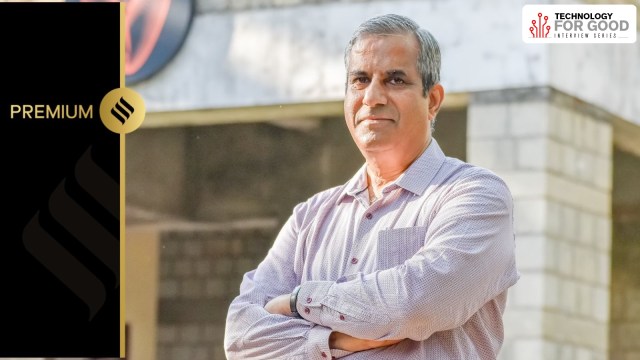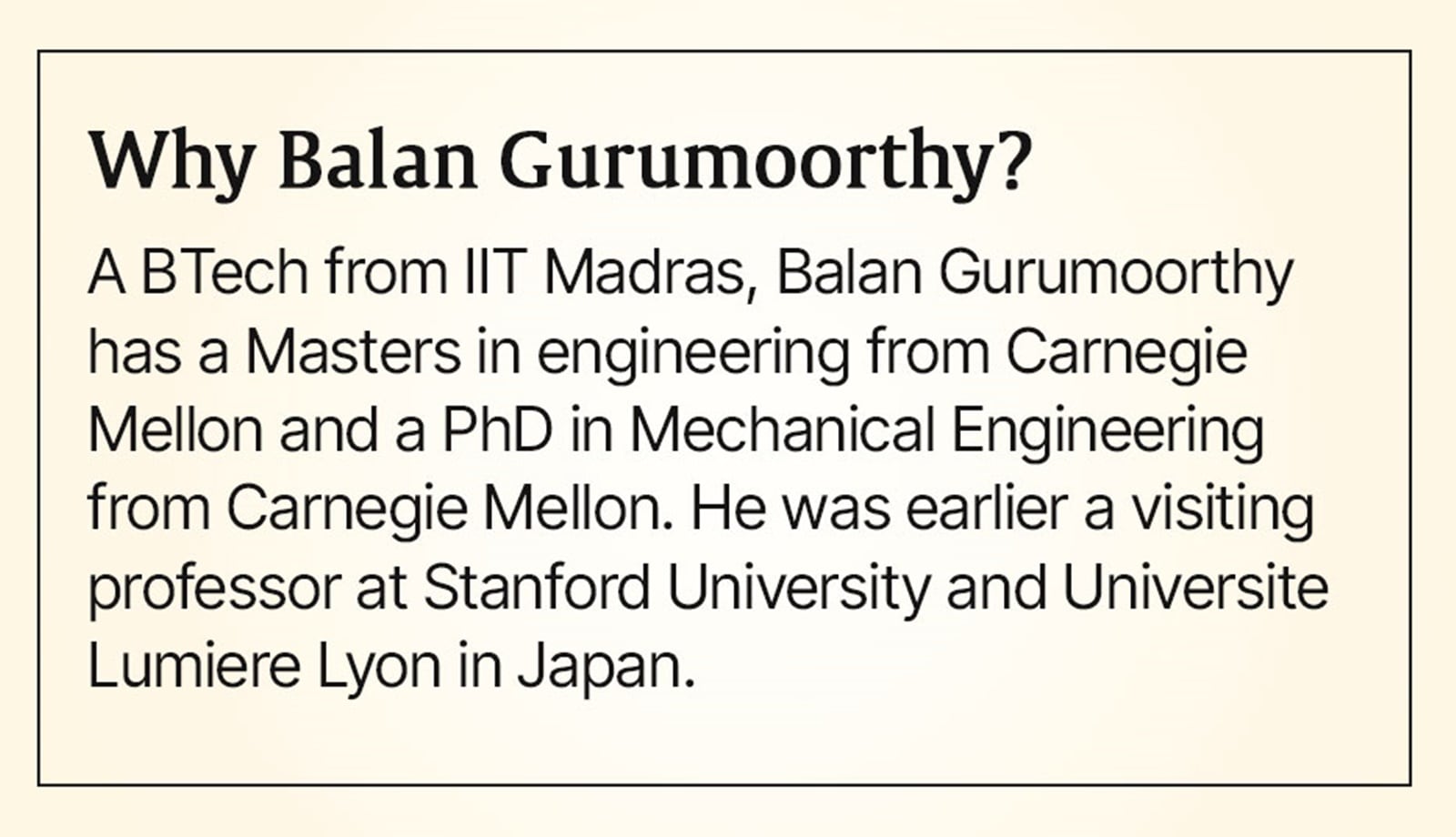Our work on newer materials for semiconductors will be a gamechanger: Prof Balan Gurumoorthy, IISc
Balan Gurumoorthy spoke to indianexpress.com on the impact FSID has had on the deeptech ecosystem in the country, its thematic incubators in geriatric healthcare, and more.
 Balan Gurumoorthy is a professor at the Indian Institute of Science, Bengaluru for the past 35 years as well as the CEO of the Foundation for Science, Innovation and Development at the IISc. (Express photo by Jithendra M)
Balan Gurumoorthy is a professor at the Indian Institute of Science, Bengaluru for the past 35 years as well as the CEO of the Foundation for Science, Innovation and Development at the IISc. (Express photo by Jithendra M)Balan Gurumoorthy is a professor at the Indian Institute of Science, Bengaluru for the past 35 years. He is also the CEO of the Foundation for Science, Innovation and Development (FSID) at the Indian Institute of Science. Set up in 1991, FSID’s mission is to use the knowledge, infrastructure and talent within IISc to help businesses. FSID is now a Section 8 company.
FSID engages with large corporations in collaborative research through its CORE programme, incubates startups that have deep science background and striving for social impact, works with midsize enterprises helping them with innovative practices, and supports rural science-based entrepreneurship.
Balan Gurumoorthy spoke to indianexpress.com on the impact FSID has had on the deeptech ecosystem in the country, its thematic incubators in geriatric healthcare, nanosciences, quantum tech, the search for new materials for the semiconductor industry, and the startups that had come out of the institute. Edited excerpts:
 Gurumoorthy is also the CEO of the Foundation for Science, Innovation and Development (FSID) at the Indian Institute of Science.
Gurumoorthy is also the CEO of the Foundation for Science, Innovation and Development (FSID) at the Indian Institute of Science.
Venkatesh Kannaiah: Can you tell us about a few innovations with social impact that emerged out of your CORE programme?
Balan Gurumoorthy: We work with large corporations and do research projects with them after signing an umbrella agreement with regard to IP ownership and licensing. We are working with 70-odd companies and around 120 projects are going on in the institute, across various deep tech domains. Sometimes, they merely fund the project and sometimes their people work with our faculty and students.
Some of the interesting deep tech projects that we are working on are on materials that reduce use of water for cleaning purposes, novel materials for transporting hazardous materials or products like hydrogen, and on building up the ability of the materials to withstand impact during accidents. We are also working on new material families for battery tech, reducing dependence on lithium-based batteries, which is of great strategic importance.
We also work on social impact projects with governments, the one with the govt of Chhattisgarh is with a product called Ram Pump. It is a really old tech and what in research circles is called ‘discarded tech’, but based on the problem of distributing water to far off areas when there are power cuts, the Ram Pump tech is of great use. It is now reengineered for distributing water to far-flung areas in Chhattisgarh. It has become so successful that the Chhattisgarh government wants to extend it to many more areas and we want to transfer the know-how to some company, so that they can take it forward and scale it up.
We are also working on a plant for producing hydrogen from biomass waste. It is a 100 kg capacity per hour plant, and it has been installed at Faridabad. It is doing well and others are keen on taking it up. Campuses with large biomass production are looking at this tech.
Venkatesh Kannaiah: Can you tell us about some innovations that have come out of your TIME programme which have created substantial impact.
Balan Gurumoorthy: With the TIME programme, we work with small and medium enterprises and provide tech to them to build products. One interesting product that came out was a machine to clean manholes. The available solutions in the market were capturing the muck and bringing it out, but the issue was that a lot of muck was left behind and it was getting solidified and blocking the manholes in due course. Our product goes inside the manhole, unfurls itself, scoops out all the muck and cleans more efficiently. It is really fast too. We have licensed out this tech to a company in Bengaluru.
 “Strand Life Sciences was one of our successful startups which went on to build digital twins for liver and developed software and services for life sciences research,” Prof Gurumoorthy says. (Express photo by Jithendra M)
“Strand Life Sciences was one of our successful startups which went on to build digital twins for liver and developed software and services for life sciences research,” Prof Gurumoorthy says. (Express photo by Jithendra M)
Another interesting product we built for small and medium enterprises was related to solid state relays and we built smart controllers. It has multiple applications, ranging from controlling temperature and moisture in greenhouses to use in painting/coating and even in manufacture of certain kinds of cookies. It is a versatile platform product, and there are a lot of takers.
Venkatesh Kannaiah: How many startups have you incubated, in what areas, with what focus, and what is the kind of social impact that it has generated?
Balan Gurumoorthy: STEM is our incubator programme and we nurture deep science-based startups. We started off early 2001 and we have 95 startups in our portfolio. Only less than 10 of them have failed. We look at startups and ideas with a long gestation period, not your normal product companies which look at a two-year window but those who look to bring out a product after nearly five years. We are very patient and we match companies with the mentor, absorb the cost of the mentor in the initial stages till it gets off the ground and since we take an equity stake of around 10 per cent in the startup, we stay committed to the long term.
Strand Life Sciences was one of our successful startups which went on to build digital twins for liver and developed software and services for life sciences research.
Bellatrix Aerospace was another startup of ours which is into propulsion tech, focused on very interesting themes like green propellants, to bring down the carbon footprint. It develops and manufactures propulsion technologies for a wide range of missions, from deploying and phasing nano and micro satellite constellations to ferrying communication satellites to the geo-stationary orbit. It is also garnering a lot of support from investors. Similarly in the spacetech space, we have Digantara, a startup which is building a live map of space, for space agencies to decide on positioning of their satellites avoiding space debris and other such issues.
Open Water is one of our startups which is into the water purification space. It has an interesting idea of purifying water using electrical fields, and is a modular tech. Right now, it is available on a paid pilot basis, and is working with large apartment complexes and companies. It has a pilot project at Mavallipura, Bengaluru’s garbage landfill. Open Water picks up turbid water from the source, and transforms it into near potable water. The tech does not use membranes and there is limited wastage.
Some of our interesting startups include Minivax building vaccines for influenza, which had also built vaccines for Covid and Polymage Labs. There is Gyroid Photonics, which uses Raman spectroscopy for varied applications, and is now finding application in finding chemicals of interest in airport screening, defence and healthcare. It is of great relevance in tumor detection, tissue imaging, and bone and skin disorders.
Venkatesh Kannaiah: What do you do with your SEED programme and what is the impact in the same. How does it work?
Balan Gurumoorthy: SEED was started with the understanding that most of our activity was bottom-up, led by founders and startups, and we wanted to look at economic issues and problems from top-down, in a more strategic manner. We picked up three areas for intensive work, like agricultural wastes, additive manufacturing and energy storage. We are also working with the government on science-based entrepreneurship in rural areas.
One interesting project was our focus on banana waste. While India is one of the largest growers of banana, we are among the smallest producers of banana fibre and we are working to see if there are any industrial applications for the same, and build some industry grade products to increase the value.
 “In quantum tech, we are investing our time in quantum sensing, computation, optimisation and devices,” says Prof Gurumoorthy. (Express photo by Jithendra M)
“In quantum tech, we are investing our time in quantum sensing, computation, optimisation and devices,” says Prof Gurumoorthy. (Express photo by Jithendra M)
Venkatesh Kannaiah: Can you tell us about one or two of your initiatives which you think are a long bet and are likely to create a huge impact.
Balan Gurumoorthy: At a larger level we are working on two areas where India needs to leapfrog. One in the semiconductor space, where we are looking at a newer materials family for semiconductors like Gallium Nitride (GaN). GaN devices have excellent thermal and electrical properties with the ability to outperform silicon devices in terms of performance and efficiency. The tech with regard to silicon use is far ahead and we as a nation are far behind. But with the newer materials that we are working on for semiconductors, the processes and the intellectual property will rest with us. We as a nation had missed some opportunities earlier in the semiconductor space, but we are fast catching up. We are building products with these new materials, the equipment is in, the trials have started, and companies are lining up for tie-ups. In the next five years, we will make a mark in this arena. As for Silicon-based semiconductors, we are catching up with the rest of the world with a different strategy.
In quantum tech, we are investing our time in quantum sensing, computation, optimisation and devices. We have traditionally been weak in certain areas but we are now catching up. This has huge implications for the strategic sector.
We must understand that quantum computing is driving new discoveries in healthcare, energy, environmental systems, smart materials, and beyond. Many multinationals from countries like Japan are keen to work or partner with us, and our collaboration would fetch us the results.







